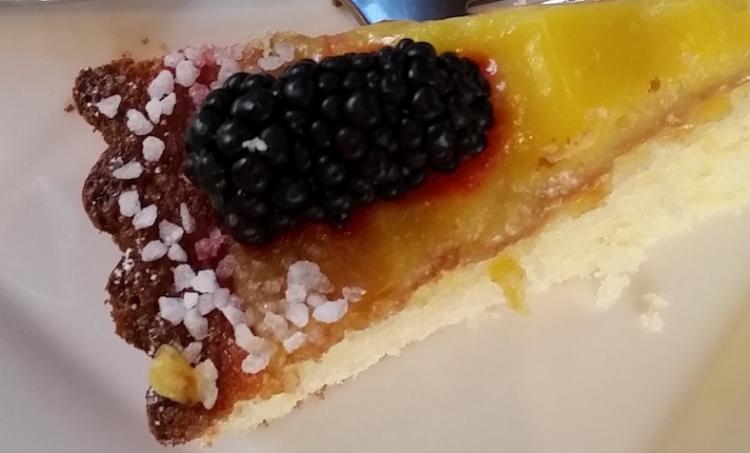The Alzheimer's Talks is a series of compelling conversations with public figures on their perspectives and personal stories about aging, memory loss, caregiving and the positive power of creative expression, presented by the Art of Alzheimer's in partnership with the UW Medicine's Memory and Brain Wellness Center (MBWC).
In the 2nd Alzheimer's Talks, 'A Brain Unwrapped,' Chef Madison Cowan, the first ever Grand Champion of Food Network's cooking competition Chopped and producer of a global culinary venture, spoke about his hope to inspire dementia awareness and proactive attitudes towards brain health.
Cowan first learned about Alzheimer's disease when his his late father developed the condition. Now, his wife's father and his daughter's grandmother live with dementia. "It's my life's mission to advance the mission of the Alzheimer's Association," he said. "I'm here for same reasons you're here. We're all affected by this disease. We need to fight back."
He painted an image of his father as strong, powerful Jamaican man, a disciplinarian at home, and an intimidating figure on the streets of Detroit in the 1970s. "My dad had hands the size of shovels," Cowan said. "I always thought he could lift the entire home we lived in on his shoulders and carry it down the road."
Yet, Cowan's father was difficult to connect with emotionally. Their relationship became even harder for him when his father developed symptoms of Alzheimer's disease. "I couldn't get my head around it," Cowan said, "because I already didn't know who he was, and now I may never find out." It wasn't until he left home and experienced his own struggles that he began to understand his dad, a person who had managed to raise ten children with limited resources.
Feeling powerless in the face of dementia, Cowan decided to make a difference in the best way he knew how - with his platform of culinary fame. He now advocates for the Alzheimer's Association and creates partnerships of chef and schools to promote food education and healthy eating.

From left: Marilyn Raichle of the Art of Alzheimer's, Marigrace Becker of UW Memory and Brain Wellness Center, Chef Madison Cowan, Shawn D'Amelio of With a Little Help, Rebecca Crichton of Northwest Center for Creative Aging
Later in the evening, Seattle Chef Thierry Rautureau joined Cowan on stage for a conversation about food and the relevance of eating and food choices to brain health and dementia, especially the MIND diet—hybrid of the Mediterranean and DASH (Dietary Approaches to Stop Hypertension) diets shown to reduce the risk of cognitive decline.
Chef Rautureau immediately tossed the word "diet" out of the lexicon. He advocated for people to incorporate MIND staples such as leafy greens, fish, olive oil, and berries into everyday cooking habits. He emphasized buying local, fresh ingredients and learning simple ways to prepare, store, and enjoy meals. However, Cowan argued for more social action in food education and policy, as many Americans live in places where healthy fresh food is difficult to access.
Rautureau made it sound easy. He suggested inviting friends over to make big batches of soup, which can be frozen and used for weeks. Olive oil, salt, pepper, and citrus on roasted vegetables—"Voila! Heaven!" He uses fruit or vegetables on the verge of over ripening to make flavorful purees, which can serve as the base of soups, sauces, smoothies, and desserts. An audience member noted that people with advanced dementia may require pureed food, and finding ways to make delicious forms could help care partners make a difference in the quality of their loved one's experience.
One of Cowan's favorite kitchen tools is the rice cooker. He said he likes to cook rice, and then add stock, canned beans, kale or chard, chicken, and seasoning. (His secret: "Crack an egg on top.") He sometimes uses coconut oil instead of butter. And, to add something sweet, he will heat up fruit and honey in a pan and serve it on a cookie with mint, or sprinkle mint and rock salt on watermelon cubes.
Marilyn Raichle, founder of the Art of Alzheimer's, was excited for food and cooking to be a theme of an Alzheimer's Talk. "What has surprised me about these Alzheimer's Talks," she said, "is not that I can find influential speakers who are committed to this cause, but that I find people like Chef Cowan who can give real options and hope to people who so often feel ill-prepared to confront dementia in the future."
♦
At the event's reception, guests were served appetizers featuring many brain healthy foods, such as avocado and tuna. Madison served one of his signature recipes, the Mediterranean Lemon Olive Oil Cake (pictured above), which features two brain-healthy ingredients of the MIND Diet: olive oil and berries. We snagged the recipe:
Ingredients:
- 1 c extra-virgin olive oil
- 1 ¼ c unbleached all-purpose flour
- 1 tsp baking powder
- ¼ tsp baking soda
- 3 eggs, room temperature
- ¾ c organic cane sugar
- 2 tsp vanilla extract
- 4 lemons, 3 zested and 1 juiced (reserve an extra Tbsp of juice)
- ½ c icing sugar
- 1 container fresh berries (optional)
Directions:
- Preheat oven to 350F. Lightly brush a 9-inch cake pan with olive oil.
- Sift flour, baking powder, baking soda into a mixing bowl and set aside.
- In another bowl, vigorously whisk eggs and sugar together for 3 to 4 minutes. Whisk in vanilla extract, lemon juice, and zest. Whisk in olive oil.
- Stir in flour until just smooth and combined, don't overmix.
- Pour batter into prepared pan and bake 25 to 30 minutes. Cool the cake 10 minutes in pan then remove to cooling rack for another 5 minutes. Stir the icing sugar and extra tablespoon of juice in a small bowl until smooth. Glaze the cake top and serve with berries.
—Genevieve Wanucha







